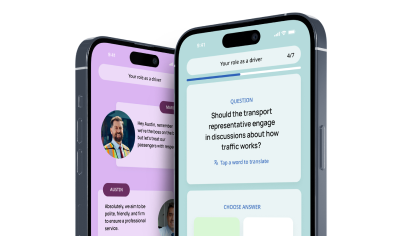In the highly competitive hotel industry, guest satisfaction is the key to success. Whether you run a hotel, restaurant, or other establishment in the hospitality sphere, ensuring that your customers have a positive experience is paramount. In this article, we will explore the importance of customer satisfaction in the hospitality industry, understand the factors that affect it, and provide practical tips on learning how to improve customer satisfaction in hospitality industry.
The importance of customer satisfaction in the hospitality industry
Guest satisfaction plays a crucial role in the success of any business in the hospitality industry. Satisfied customers are more likely to become repeat customers, recommend your establishment to others, and leave positive reviews. On the other hand, dissatisfied guests can tarnish your reputation, negatively impact your business, and lead to revenue loss. Therefore, prioritising guest satisfaction is essential for maintaining a loyal customer base and attracting new customers.
Furthermore, in the competitive hospitality industry, where customers have many options, providing exceptional customer service can be a crucial differentiator. Going above and beyond to meet and exceed customer expectations can set your establishment apart from the rest. This could involve personalised services, attention to detail, and a genuine willingness to make each guest’s experience memorable.
Moreover, customer satisfaction concerns the service provided during a guest’s stay and the entire guest journey. From the moment a potential customer interacts with your brand online or through marketing materials to the post-stay follow-up, every touchpoint is an opportunity to create a positive impression. Consistency in delivering high-quality service at every stage can help build trust and loyalty among customers, ensuring they choose your establishment over others repeatedly.
Understanding factors affecting customer satisfaction
Delivering an outstanding guest experience is crucial for any hotel aiming to build a strong reputation and encourage repeat business. Several key factors influence how satisfied guests feel during their stay, from the quality of service to the amenities provided. By addressing these areas effectively, you can enhance customer satisfaction, increase positive reviews, and foster long-term loyalty. Below are the most critical elements that shape guest satisfaction and how you can optimize them for a better overall experience.
1. Quality of service
The quality of service your staff provides hotel guests is one of the most significant factors affecting guest satisfaction. Guests expect attentive, friendly, and efficient service throughout their stay, from check-in to check-out. Make sure your staff receives proper training to deliver exceptional service consistently.
2. Cleanliness and maintenance
Guests want a clean and well-maintained environment in their rooms and public areas. Regular inspections, thorough cleaning routines, and prompt maintenance are essential to meeting these expectations.
3. Amenities and facilities
The amenities and facilities you offer also significantly affect customer satisfaction. Ensure that your offerings align with your guests' needs and preferences. From comfortable beds and high-quality toiletries to modern fitness centres and relaxing spas, consider what will make happy guests enhance their experience and set them apart from the competition.
4. Value for money
Guests want to feel that they are getting value for their money when staying at your establishment. This doesn't mean you have to be the cheapest option, but rather provide a level of service and experience that justifies the price. Transparency in pricing room service and offering competitive rates can contribute to customer satisfaction.
5. Guest experience
The overall guests experience encompasses all interactions a guest has with your establishment. This includes their interactions with staff, the ease of booking, the check-in and check-out processes, and any additional services or amenities they may avail themselves of during their stay. Ensuring a seamless and positive experience at every touchpoint can significantly improve guest satisfaction and boost customer satisfaction.
6. The impact of personalisation
Tailoring the experience to individual preferences and needs can create a sense of exclusivity and make guests feel valued throughout the guest's journey. This can be achieved through personalised greetings upon arrival, offering customised room amenities, or providing recommendations based on their interests and preferences.
7. Engaging guests via various comms channels
Utilising social media platforms, email newsletters, and personalised follow-up messages can help build a strong connection with guests, keeping them informed about special offers, events, and updates. This proactive approach demonstrates your commitment to their satisfaction and fosters a sense of loyalty.
8. Staff self-assurance
Lastly, investing in staff development and empowerment can significantly impact customer satisfaction. Encouraging employees to take ownership of guest experiences, providing them with the necessary tools and resources to resolve issues promptly, and recognising their efforts can create a positive work environment that translates into exceptional service for guests.
Tips on how to improve guest satisfaction in the hospitality industry
Guest satisfaction is the backbone of a successful hospitality business, and providing exceptional customer service is key to achieving it. Happy guests are more likely to leave positive reviews, recommend your establishment, and return for future stays. Improving customer satisfaction requires a combination of excellent service, attention to detail, and proactive engagement. Below are some practical strategies to enhance the guest experience and build lasting relationships with your customers.

Tip 1. Invest in staff training
Your staff is at the forefront of providing exceptional service. Invest in comprehensive customer service training programs that equip them with the necessary skills and knowledge to exceed guests’ expectations and improve hotel guest satisfaction. Continuous training and development for hotel staff can help them stay updated on industry trends and enhance performance.
Tip 2. Enhance communication with guests
Effective communication is vital for understanding guests' needs and resolving issues promptly. Encourage your staff to maintain open lines of communication and actively listen to guests' feedback, concerns, and preferences. Implementing a reliable system for guest communication can go a long way in improving overall customer satisfaction.
Tip 3. Personalise guest experiences
Customers appreciate personalised experiences that make them feel valued and special. Gather guest preferences and utilise them to enhance their stay. This could involve surprise gestures, personalised amenities, or special offers tailored to the guest's journey and their needs and preferences.
Tip 4. Maintain high standards of cleanliness
Consistently upholding high standards of cleanliness and maintenance is crucial for hotel guest satisfaction in hotels everywhere. Regularly inspect rooms and public areas to ensure cleanliness, address any issues promptly, and invest in the necessary resources to maintain cleanliness standards at all times.
Tip 5. Offer competitive and transparent pricing
Guests appreciate transparency when it comes to pricing. Provide clear information about your rates, packages, and any additional charges upfront. Offering competitive pricing while delivering quality services and amenities will give guests peace of mind and enhance their overall satisfaction.
Furthermore, another critical aspect to consider in improving guest satisfaction in the hospitality sphere is to provide a seamless and efficient check-in and check-out process. Guests value their time and appreciate a hassle-free experience. Implementing technology such as self-check-in kiosks or mobile check-in options can significantly enhance the overall hotel guest experience.
How to measure guest satisfaction
Understanding guest satisfaction is crucial for improving service quality and ensuring repeat business in the hospitality industry. Measuring guest satisfaction allows you to identify strengths, address weaknesses, and make data-driven improvements. By gathering and analyzing guest feedback through various channels, you can gain valuable insights into their experiences and expectations. Here are some effective methods to measure guest satisfaction and enhance overall service quality.
1. Guest surveys and feedback forms
Conducting guest surveys and using feedback forms can provide valuable insights into guest satisfaction levels. Ask specific questions about their experience, both positive and negative aspects, and use the feedback to identify areas for improvement.
Furthermore, when designing hotel guest satisfaction surveys, it is essential to balance open-ended questions that allow guests to express their thoughts freely and closed-ended questions that provide quantifiable data. This combination can offer a comprehensive understanding of guest satisfaction and highlight specific areas that require attention.
2. Online reviews and ratings
Online reviews and ratings are potent indicators of how to improve customer satisfaction in the hospitality industry. Encourage guests to review their experience on popular review platforms and respond to their feedback promptly. Addressing negative reviews publicly demonstrates your commitment to customer satisfaction and can help attract more positive reviews.
In addition to responding to online reviews, monitoring review platforms regularly can help you stay updated on the latest feedback trends. By actively engaging with guests' reviews, you show dedication to guest loyalty by improving their experience and building a positive online reputation to attract new customers.
3. Analysing guest feedback
Regularly analyse guest feedback from various sources, such as surveys, online reviews, and social media comments. Look for patterns and trends to identify areas for improvement. Learning from your guests' experiences can help you make informed decisions to enhance customer satisfaction.
Moreover, consider implementing sentiment analysis tools to delve deeper into guest feedback. These tools can help categorise feedback based on emotions, allowing you to pinpoint areas that evoke strong positive or negative reactions from guests. By harnessing the power of sentiment analysis, you can tailor your strategies to address specific emotional triggers to boost guest satisfaction and elevate guest satisfaction levels.
Benefits of improving customer satisfaction in the hospitality industry
Investing time and resources into enhancing customer satisfaction can yield numerous benefits for your hospitality business. Increased customer loyalty leads to repeat visits and positive word-of-mouth recommendations, which can attract new customers. Additionally, satisfied and loyal customers are more likely to leave positive reviews and ratings, boosting your online reputation. Ultimately, improving customer satisfaction contributes to increased revenue and long-term success.
Furthermore, in the competitive landscape of the hospitality industry, customer satisfaction plays a pivotal role in setting your business apart from rivals. You can create a unique selling point that differentiates your establishment by providing exceptional, personalised service and exceeding customer expectations. This can result in a loyal customer base that actively chooses your services over competitors, leading to a sustainable advantage in the market.
Moreover, focusing on customers and ensuring guest satisfaction can profoundly impact employee morale and productivity within your hospitality business. When staff members witness the positive outcomes of their efforts in creating memorable experiences for guests, it can boost their job satisfaction and motivation. Happy and motivated employees are more likely to deliver exceptional service consistently, further enhancing the overall customer experience and solidifying your business's reputation for excellence.
Take your hospitality training to the next level with Lingio

Ready to elevate your team's skills and enhance guest satisfaction? Discover the power of Lingio's innovative learning solutions, where AI, gamification, and expert coaching combine to create a delightful training experience as your guests stay. Stay ahead in the hospitality industry by providing your staff with engaging, relevant, and educational content designed to meet the demands of today's market. Take advantage of the opportunity to transform your customer service. Book a demo today and witness how Lingio can make learning for your hospitality professionals fun and effective.
FAQs
1. What is the ideal staff-to-guest ratio in the hospitality industry?
The ideal staff-to-guest ratio may vary depending on the type and size of the establishment. However, maintaining a ratio that allows personalised attention and prompt service is crucial for guest satisfaction.
When considering the staff-to-guest ratio, it's essential to factor in peak times and special events that may require additional staffing to ensure a seamless guest experience. By having a flexible approach to staffing levels, you can adapt to fluctuating demands and maintain high service standards across all areas of your establishment.
2. How often should guest rooms be inspected for cleanliness?
Guest rooms should be inspected daily to ensure cleanliness standards are met. Regular inspections will help promptly identify and address any issues, ensuring guests have a pleasant and comfortable stay.
In addition to daily inspections, conducting deep cleaning sessions regularly is beneficial to maintain a high level of cleanliness and hygiene. This proactive approach not only enhances the guest experience but also contributes to your establishment and the hotel industry's overall reputation and success.
3. Is it essential to respond to every online review?
While responding to every online review is ideal, it may only sometimes be possible. However, make it a priority to respond to negative reviews promptly and professionally. This shows potential guests that you value feedback, strive to exceed guest expectations, and provide excellent customer service.
Responding to positive reviews is equally important as it allows you to express gratitude and reinforce a positive relationship with satisfied guests. By engaging with online reviews, you demonstrate transparency and a commitment to continuous improvement and repeat business, which can enhance your reputation and attract new guests to your establishment.


Table of contents
Intro
The importance of customer satisfaction in the hospitality industry
Understanding factors affecting customer satisfaction
Tips on how to improve guest satisfaction in the hospitality industry
How to measure guest satisfaction
Benefits of improving customer satisfaction in the hospitality industry
Take Your Hospitality Training to the Next Level with Lingio
FAQs


